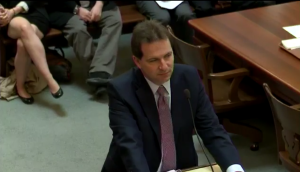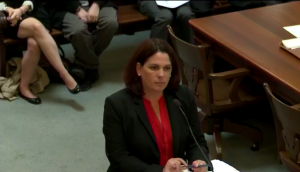
A long-running copyright fight between the Electronic Frontier Foundation and Universal Music over fair use in the digital age was considered by an appeals court today, a full eight years after the lawsuit began.
EFF and its client Stephanie Lenz sued Universal Music Group back in 2007, saying that the music giant should have realized Lenz's home video of her son Holden dancing to Prince's "Let's Go Crazy" was clearly fair use. Under EFF's view of the Digital Millennium Copyright Act, Universal should have to pay damages for a wrongful takedown.
If EFF wins the case, it could have repercussions for how copyright takedowns work online. The group is trying to make Universal pay up under 17 USC 512(f), the section of the DMCA that penalizes copyright owners for wrongful takedowns. Currently, victories under that statute are exceedingly rare and happen only in extreme circumstances.

That's especially true in a world where hundreds of hours of video is uploaded to YouTube every minute. Takedown notices number in the millions, he noted.
The judges pushed Klaus, noting that some type of analysis was done by the employee hunting for Prince music.
"They didn't say [to him], 'if you see anything at all, take it down,'" said US Circuit Judge Mary Murguia. "Why was that?"
"Universal believes... if there was a fleeting use of something, or deep background—like something playing on a jukebox in the background—that he would not put that on the list," Klaus answered.
Whatever the nature of Universal's review, it certainly wasn't done in "bad faith," he pointed out.
"Do you concede the video was fair use?" asked Murguia.
"No," said Klaus. "If this was litigated, this would be a challenging case for both sides."

US Circuit Judge Richard Tallman pressed McSherry for details on what kind of fair use analysis would be sufficient in her view.
"Suppose MPAA creates the office of fair use wizard," said Tallman. "Mr. Johnston [the Universal employee] comes to him with this video, and the [fair use] factors. The wizard says, 'I don't think this is fair use.' Would that be sufficient?"
"That's more than Universal did," McSherry said. "No, I don't think that would be sufficient."
"Well maybe we need a tribunal!" Tallman said. "Consisting of three people, with computer and fair use expertise."
"I don't think we need to get that far," McSherry said. "You have to consider fair use, and the decision has to be objectively reasonable."
"So there has to be subjective good faith, and after the fact, it has to be objectively reasonable?" asked Tallman. "And where do I find that in the statute?"
"There we need to infer a little bit," McSherry conceded.
The video is still up, another judge pointed out, and it's been viewed more than one million times.
"Before this lawsuit was filed, there were 273 views, and I'm pretty sure they were all from Ms. Lenz's mom," McSherry said.
"We will puzzle our way through and do our best to give you a coherent answer," said Tallman, concluding the hour-long argument.
The last ruling in the case came in 2013, when US District Judge Jeremy Fogel declined to hand a clear win to either EFF or Universal. He said the fair use issue could proceed to a jury trial, but EFF would have to show that Universal exhibited "willful blindness" in order to win its case. Both sides appealed, leading to today's 9th Circuit hearing.
reader comments
98